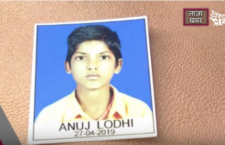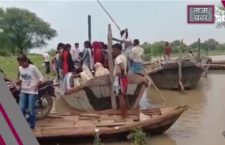Gulabkali’s family owns three bigha land in Chitrakoot district’s Mawai Kala village. In 2019, her father-in-law’s demise and the floods have delivered a double blow to the family. Their crops of bajra and arhar are all underwater now. And there seems to be no help or hope on how they will recover from this loss.
All across Chitrakoot, villages that are on the banks of Yamuna are facing this same problem. Farmers have lost all of their crops, leaving them absolutely empty-handed. Of the approximately 175 hectares of land available for agriculture, 75% is dependent on rains for their output. And this year’s heavy rainfall has left the farmers’ in Chitrakoot destitute. Since September of 2019, the water level of Yamuna has increased, resulting in floods in over 50 villages situated on its banks. In Mawai kala, houses had literally upended with the force of the river water. With most families living in makeshift shelters, the situation grows dire with the loss of crops and the subsequent loss of most resident’s only source of income.
Agriculture is the mainstay for most of the residents of this area. Umashankar, a local farmer, estimates that about 150 farmers in Mawai Kala have lost all of their crops to the floods. “I have about 4-5 bigha of land on which I had sowed bajra, dhan, tilli. Now there is nothing left, not even enough to eat. Everything is under water.” His hands make a wide arc to show what looks like a wide length of a muddy river, but is in fact farmland that is still under water.
Chitrakoot’s soil and peculiar climate already put farmers at a disadvantage as compared to other regions. With the floods, the kharif crops are now decimated and the rabi season continues to look equally hopeless with no signs of the farmland recovering in time. In Mawai Kala, the crops sown were mostly bajra, jowar, arhar, tilli and dhan. “We got bajra seeds for Rs. 400 per packet. Arhar was Rs. 100 per kg. Tilli for Rs. 150 per kg. We somehow managed to collect enough money for these seeds and sow them. And now it is all gone.”, Yashoda Devi says. She has no other source of income and will have to depend on her children who have moved to a bigger city where they will have better, and less erratic, job prospects. “We will somehow manage to survive. But it’s more difficult to take care of animals. I don’t know where to get their feed from.” Her concern resounds with other families in Bundelkhand, where dairy animals like cows, buffaloes and goats play a very important part in rural economy.
About 20 villages have been severely affected and there seems to be no signs of help from the government till now. Chhutkai, a farmer, had sowed arhar, mung and urad amongst other crops. Farming helped her earn just about enough to run her household, now she will try to find work as a daily wage labourer somewhere if she wants to earn some money. “It’s either that or sit hungry at home.”
Floods are not new to this area of Bundelkhand. Yamuna, Ken and Betwa all flow through Bundelkhand. There are many low-lying areas like Mawai Kala where flooding has become a way of life. But schemes for permanent housing that can protect residents from losing their homes and moving away from rain-fed agriculture to practices that help increase ground water retention are slow in uptake. The local administration claims to be following due process but even after two months of flood-like situations, no help has reached the Mawai Kala residents. As per Chhutkai, there are five thousand farmers and twenty-five thousand people, that have now been plunged into utter poverty because of the floods.
The situation worsens for those who have rented their farmlands. A Mawai kala resident says the landowners get some compensation, but for those who are working on another’s land, there is no recompense. “We get 2000 rupees. What is 2000 rupees? That barely covers the costs of buying the seeds and sowing them. What about the person doing the hard work? The landowner gets compensation but what about the people renting it and working the fields, doing all the labour?”
Nobody has come to meet the residents of Mawai Kala or to take stock of the situation. “There is very little farming land to begin with,” says Bhulaal, another farmer, “And on top of that whatever little we had, was destroyed. There is no government help till now. We spend our whole lives struggling.”
The local administration, meanwhile, says that due process is being followed. On being questioned, the District Magistrate, Sheshmani Pandey, said that due process includes investigation and a survey which the local administration was doing with the Ministry of Agriculture and Farmers’ Welfare. The residents however do not side with this claim,“We have not received anything till now. No one has come to do the survey. You are the first one.” “We haven’t filed a written complaint anywhere. We have been told to write to the accountant and that he may be able to help us.”
The farmers of Mawai kala are looking for ways to put together their lives that the floods have upended while The administration continues to try to unravel the red tape around compensation. The lands stay submerged with the sown crops rotting underneath.

